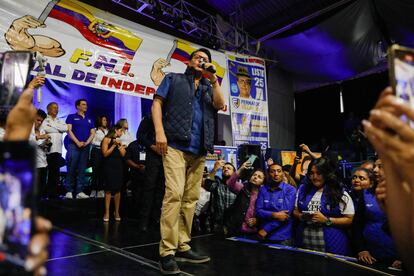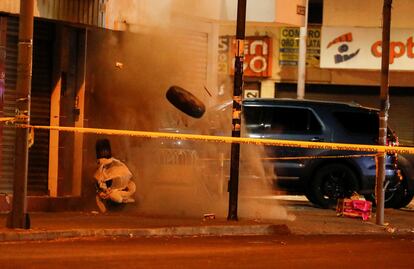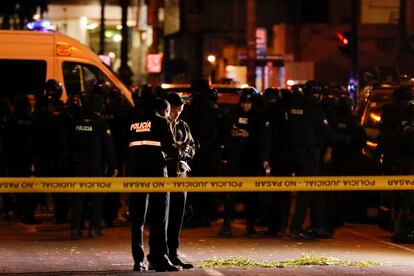Ecuador declares state of emergency following assassination of presidential candidate Fernando Villavicencio
The politician, who was close to President Guillermo Lasso, was shot three times in the head after a campaign rally in Quito

The assassination of presidential candidate Fernando Villavicencio has plunged Ecuador into crisis just days before the country is set to elect a new leader. In response to the murder on Wednesday, President Guillermo Lasso declared a state of emergency on Thursday, a measure that will be in place for the next 60 days. “The armed forces are mobilized throughout the national territory to guarantee the security of citizens, the tranquility of the country, and the free and democratic elections of August 20, as planned by the National Council of Ecuador [CNE],” said Lasso after an emergency meeting with his security cabinet.
Villavicencio was shot to death Wednesday afternoon after participating in a campaign event in Quito. The attack took place at 6:20 p.m. local time at a school in the capital when the candidate was leaving the rally. Villavicencio — whom most polls placed in fourth or fifth position among the eight candidates running for president — was shot three times in the head. He portrayed himself as an anti-corruption candidate and campaigned under the slogan, “It’s time for the brave.”
Villavicencio was rushed to a medical center near the site of the shooting. Carlos Figueroa, a personal friend of Villavicencio, said in a video posted on social networks that the candidate died from gunshot wounds. Minister of the Interior Juan Zapata confirmed his death shortly afterward.
The gunmen fired at least 40 shots and wounded other people accompanying him. Hours later, Lasso confirmed the arrest of at least six suspects, who, according to the Prosecutor’s Office, were detained in raids in two districts of Quito. The president said that the investigations were ongoing, and that authorities “will apply the full force of the law” against those responsible. “This is a political crime that has a terrorist character, and we are in no doubt that it is an attempt to sabotage the electoral process,” said Lasso.
The president also pointed to organized crime, and said that it was “no coincidence” that the assassination happened just a few days before the first round of the vote, which is scheduled for August 20. Lasso pointed out that Villavicencio himself had recently reported that he had received death threats from a criminal group linked to the Sinaloa Cartel.
In addition, Lasso decreed three days of national mourning to honor Villavicencio’s memory, while the president of the CNE, Diana Atamaint, indicated that the date of the elections will not be moved.
Before heading the Movimiento Construye candidacy, the 59-year-old politician and journalist was a member of the country’s National Assembly until its dissolution and chaired the Oversight Committee. During the impeachment trial against Lasso, Villavicencio was criticized because the commission he oversaw issued a report favorable to the president, which did not have the support of the other legislators. The assassination took place 11 days before the elections in a country suffocated by an unprecedented crisis. During the campaign, the mayor of Manta, a key port for drug trafficking, and a candidate to the National Assembly were also murdered.

In an August 9 interview with the TV network Ecuavisa, Villavicencio criticized the role of authorities in the fight against organized crime. He stated that “the police know where the hideouts of criminals, drug traffickers, illegal miners, and white-collar criminals are,” and promised that one of the first things he would do if he became president would be to clean up the security forces. He also recently said that he had received threats from Alias Fito, the leader of the drug trafficking group Los Choneros. “If I continue mentioning Fito and Los Choneros they will break me,” he warned. However, he refused to back down: “Here I am, I am showing my face, I am not afraid of them.”
Los Choneros is a drug trafficking group founded in the late 1990s in the coastal city of Manta. After growing for years, it has become one of the most powerful criminal organizations in Ecuador and currently works for Mexico’s powerful Sinaloa Cartel in cocaine trafficking. Among its adversaries are Los Lobos, Tiguerones and Chone Killers, three gangs that run logistics operations for the rival Mexican group, Jalisco New Generation Cartel.
Lasso expressed his dismay at the murder and assured that the crime “will not go unpunished.” “My solidarity and condolences [go out] to his wife and daughters,” the president added, announcing an urgent meeting of the security cabinet at the Carondelet presidential palace. “I have asked the president of the National Electoral Council, Diana Atamaint; the state attorney general, Diana Salazar; the president of the National Court of Justice, Ivan Saquicela; and other state authorities to urgently attend this meeting to discuss this event that has shocked the country,” he continued in a message broadcast through his social networks. “Organized crime has gone too far, but the full weight of the law will fall on them,” he said.

Luisa González, the candidate from former president Rafael Correa’s party and who is leading the polls, suspended her campaign upon hearing the news: “I receive with indignation the terrible news of the attack that caused the death of Fernando Villavicencio. This is a shame for all of us, my solidarity embrace to all his family and [members of his party]. This vile act will not go unpunished!”
Hours later, Correa, who lives in Belgium, also condemned the crime. “Fernando Villavicencio has been murdered. Ecuador has become a failed state. You are in pain, my homeland. My solidarity goes out to his family and to all the families of the victims of violence. Those who seek to sow even more hatred with this new tragedy, I hope they understand that it only continues to destroy us,” he wrote on his Twitter account.
“Villavicencio was the epitome of the anti-Correa movement, and theories are going to point that out. It is a turning point in a stagnant campaign, filled with candidates with no clear identity. The campaign will not be the same, after the murdered candidate,” Pedro Donoso, director of the consulting firm Icare, told EL PAÍS. “An opinion profile indicated that 14% of Ecuadorians considered Villavicencio as the candidate who would promote a government similar to the one of Guillermo Lasso. The idea was installed in a sector that he was close to the president. Indeed, his main candidate for the Assembly was Lasso’s former interior minister, Patricio Carrillo.”
Sign up for our weekly newsletter to get more English-language news coverage from EL PAÍS USA Edition
Tu suscripción se está usando en otro dispositivo
¿Quieres añadir otro usuario a tu suscripción?
Si continúas leyendo en este dispositivo, no se podrá leer en el otro.
FlechaTu suscripción se está usando en otro dispositivo y solo puedes acceder a EL PAÍS desde un dispositivo a la vez.
Si quieres compartir tu cuenta, cambia tu suscripción a la modalidad Premium, así podrás añadir otro usuario. Cada uno accederá con su propia cuenta de email, lo que os permitirá personalizar vuestra experiencia en EL PAÍS.
¿Tienes una suscripción de empresa? Accede aquí para contratar más cuentas.
En el caso de no saber quién está usando tu cuenta, te recomendamos cambiar tu contraseña aquí.
Si decides continuar compartiendo tu cuenta, este mensaje se mostrará en tu dispositivo y en el de la otra persona que está usando tu cuenta de forma indefinida, afectando a tu experiencia de lectura. Puedes consultar aquí los términos y condiciones de la suscripción digital.








































